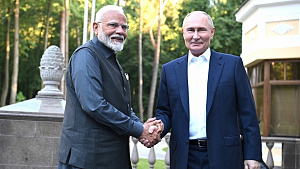Narendra Modi’s Visit to Russia: Strengthening Bilateral Ties Amid Global Shifts
In a landmark visit, Indian Prime Minister Narendra Modi arrived in Russia on July 8th for a two-day official trip, highlighting the intricate and evolving relationship between the two nations. The trip marks Modi’s first international visit following his re-election as prime minister earlier this year and his first visit to Russia since 2019.
Upon his arrival at Moscow’s Vnukovo 2 airport, Prime Minister Modi was greeted with a guard of honor and an orchestra playing the national anthems of both India and Russia. This reception underscores the ceremony and significance attributed to this high-profile visit.
Key Discussions and Economic Cooperation
During the visit, Modi is set to engage in discussions with Russian President Vladimir Putin, focusing on the future development of Indo-Russian relations. Primary among the topics of discussion is economic cooperation, particularly in the realm of financial transactions and currency settlements. Both leaders are expected to explore the use of national payment systems in cross-border trade, with the Indian RuPay system being potentially implemented in Russia and its Russian counterpart, Mir, introduced in India. Such initiatives aim to bolster economic ties and reduce dependency on traditional global financial channels, reflecting a broader trend towards financial sovereignty.
On July 8th, an informal meeting took place at Novo-Ogaryovo, near Moscow. President Putin congratulated Modi on his re-election, setting a tone of camaraderie and mutual respect for the discussions to follow. "It’s very glad to see you. We will have an official conversation tomorrow. And today we can have a quiet conversation at home, probably about the same issues, but unofficially," said the Russian President, emphasizing the informal yet strategic nature of their dialogue.
A Historic Visit
Experts in international relations have deemed Modi’s visit historic, not only due to its timing but also because of the significant agenda it entails. This visit is Modi’s inaugural trip abroad following his re-election for a third term, marking a period of renewed leadership and potential shifts in India’s foreign policy framework.
Prime Minister Modi reciprocated Putin’s warm welcome by expressing his delight and gratitude. "To visit a friend’s residence is, of course, a great joy. You have invited me to your home. I would like to thank you for creating such an interesting visit programme," Modi stated, reinforcing the personal rapport between the two leaders, which is crucial for bilateral negotiations.
Context and Global Implications
The India-Russia relationship has historically been robust, grounded in mutual strategic interests. However, in recent years, both nations have faced new global dynamics with shifting alliances and economic challenges. This visit comes at a crucial juncture as both countries navigate complex international waters, including sanctions, trade wars, and a recalibration of global power structures.
Economic cooperation, particularly in using national currencies for trade, is a strategic move to counterbalance global economic uncertainties and potential sanctions. It also represents a broader trend where nations are seeking to localize their economic dependencies and enhance bilateral ties outside traditional Western financial systems.
In conclusion, Narendra Modi’s visit to Russia signifies a pivotal moment in Indo-Russian relations. The discussions and agreements anticipated during this visit have the potential to reshape economic and political alliances, reinforcing both nations’ positions on the global stage. As the world watches, the outcomes of this visit could signal new pathways of cooperation and strategic alignment between two of the world’s largest countries.
